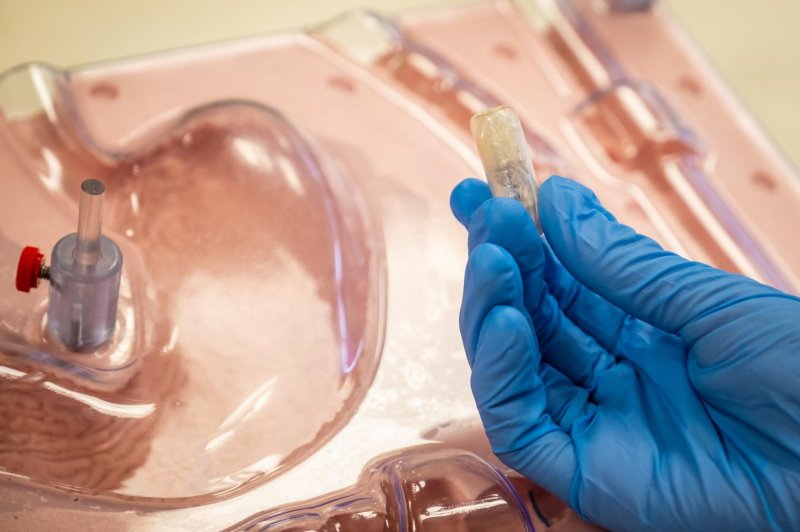A capsule called the EndoPil, a swallowable pill that expands into a balloon in the stomach, could help people lose weight without surgery. Photo by NTU Singapore
April 24 (UPI) -- A new balloon may be the key to helping people lose weight.
A capsule called the EndoPil, which contains a balloon that expands in the stomach with help of a magnet, is due to be presented at Digestive Disease Week in May, according to researchers that developed it.
"EndoPil's main advantage is its simplicity of administration," said Louis Phee, a mechanical engineering professor at Nanyang Technological University and study author, in a news release. "All you would need is a glass of water to help it go down and a magnet to activate it."
After swallowing the pill and drinking a glass of water, an activation magnet on EndoPil is triggered by another magnet outside of the body to start expansion of the balloon. From there, acid and salt inside the balloon combine to create carbon dioxide which further expands the balloon.
The balloon, which can inflate to about 120 milliliters, drifts to the top portion of the stomach and creates a sense of fullness.
After the month-long treatment, the patient can remove the capsule by deflating the balloon with a magnet.
Researchers tested the balloon with pigs, finding that those given the balloon lost more than three pounds in one week, while other not given the balloon gained weight.
While similar inflatable devices already exist for weight loss, those less appealing options require patients to have intragastric balloons surgically inserted in their stomachs, according to the researchers. And up to 20 percent of those procedures require early removal because the intragastric balloons can cause nausea and vomiting.
Other forms of the capsule method exist but require the patient to swallow multiple capsules.
In 2018, the researchers performed a trial of EndoPil on a woman in Singapore, who reported no discomfort or complications after its inflation.
Now, the researchers want to perform more human trials using an altered version of the original EndoPil that doesn't require a magnet for inflation and deflation.
"We are now trying to reduce the size of the prototype, and improve it with a natural decompression mechanism," Phee said. "We anticipate that such features will help the capsule gain widespread acceptance and benefit patients with obesity and metabolic diseases."















